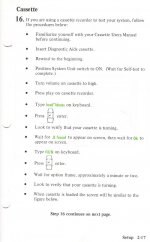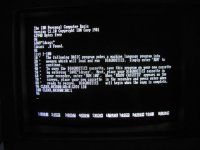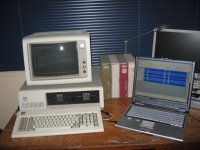Does anybody have a cassette adapter for their 5150? I've got a wave file of this, and I'm curious to hear what it does. (I don't have an adapter, and don't see myself making one any time soon.)
The WAV file runs about 3:40 and should contain around 36KB of data. (0's take .5 milliseconds and 1's take 1.0 milliseconds .. I assume an average distribution that gives about 0.75 milliseconds per bit.)
Mike
The WAV file runs about 3:40 and should contain around 36KB of data. (0's take .5 milliseconds and 1's take 1.0 milliseconds .. I assume an average distribution that gives about 0.75 milliseconds per bit.)
Mike



